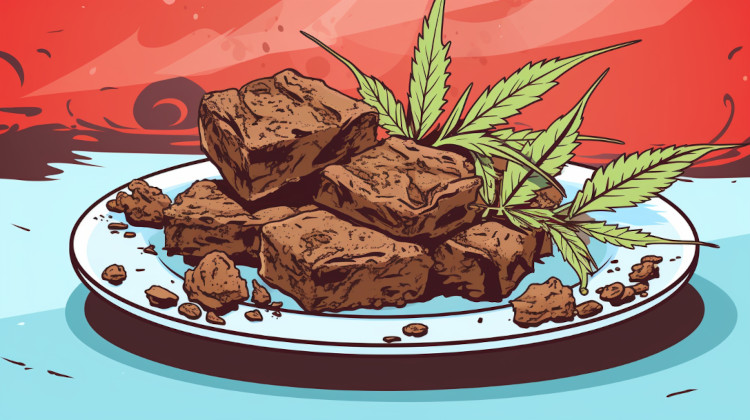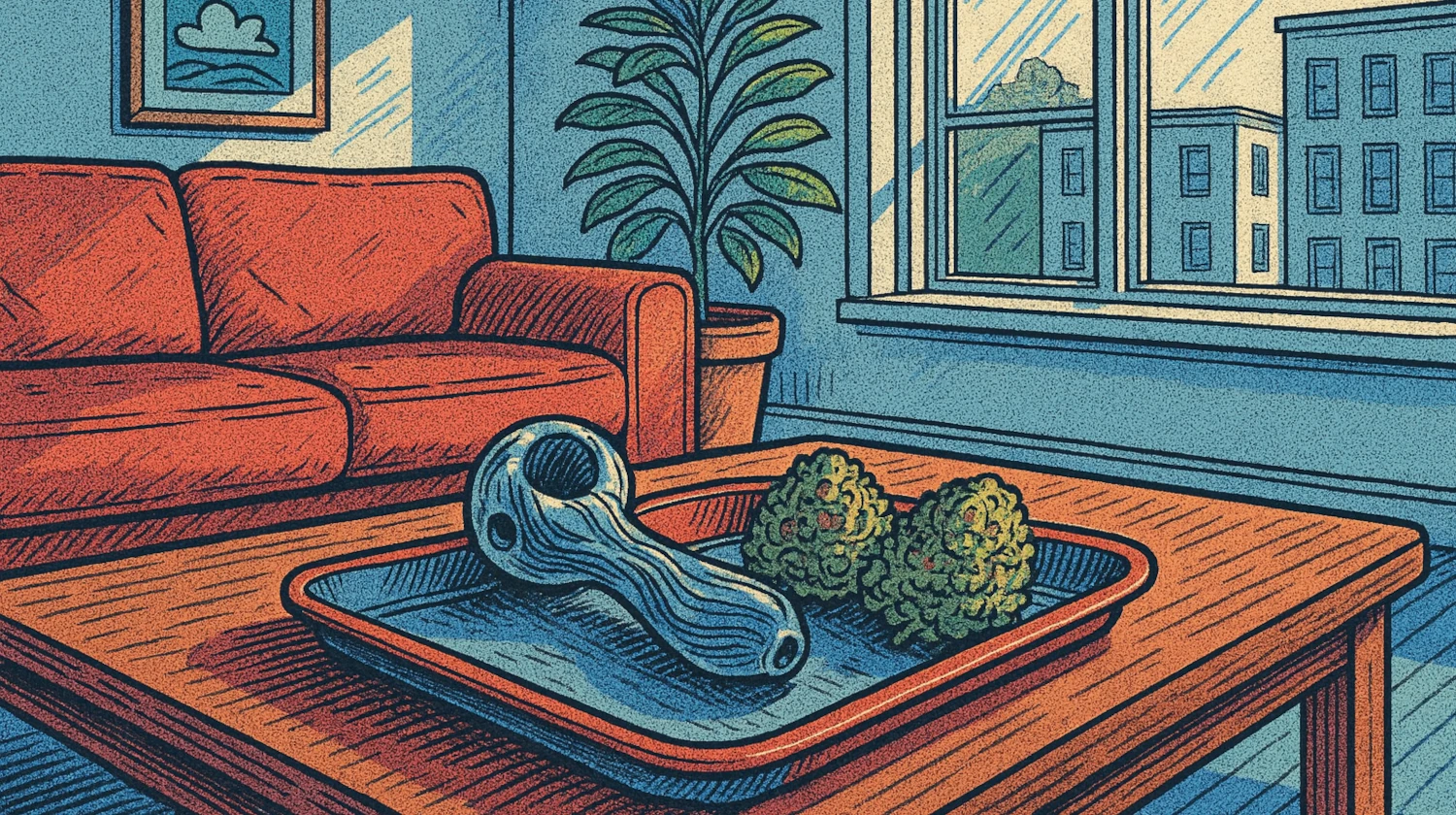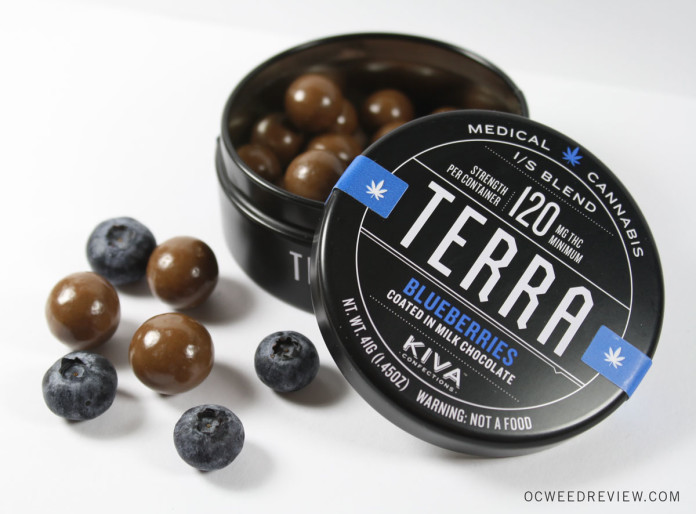In This Article
- THC and Smoking: How it Affects the Body
- Why Does Weed Make You Cough?
- How Does Coughing Affect THC Absorption?
- Does Coughing Get You Higher?
- What are the Risks of Coughing From Smoking Weed?
- Short-term Health Risks
- Long-term Health Risks
- Harm of Smoke to the Lungs
- Avoid the Cough: Alternatives to Smoking Weed
- Edibles
- Vaporizers
- Concentrates and Extracts
- Topicals
- References
Key Takeaways
- Coughing can be provoked by irritation caused by smoke.
- Some believe coughing while smoking cannabis enhances the absorption of THC and elevates the high.
- Coughing prematurely ejects inhaled smoke, reducing the time available for THC to be absorbed efficiently.
Smoking cannabis remains one of the oldest and most prevalent ways of consuming. The act of inhaling the rich, aromatic smoke has become an integral part of the cultural identity surrounding the plant.1
A virtually unavoidable aspect of smoking cannabis is coughing. Given the propensity of the cough, an urban legend of sorts has emerged: Does coughing get you higher? This notion suggests that a hacking cough is a testament to the herb's potency and an indicator of a stronger and more euphoric experience on the horizon.
But is there any truth to this? Does coughing really get you higher? Or is this merely an old wives’ tale that has persisted over time?
THC and Smoking: How it Affects the Body
At the heart of the cannabis experience lies tetrahydrocannabinol, better known as THC. This cannabinoid, found abundantly in the cannabis plant, is responsible for the euphoric sensations commonly referred to as the “high.”
The compound produces its effects by interacting with our endocannabinoid system. This intricate network of receptors and molecules helps regulate various physiological functions, including mood, appetite, and pain.
When THC binds to specific cannabinoid receptors, particularly those concentrated in the brain, it sets off a chain of chemical reactions that leads to alterations in perception, mood, and cognition.2
When you smoke cannabis, THC gets absorbed by your body right away. Inhaling the heated smoke from a burning cannabis bud or concentrate allows THC molecules to rapidly enter the bloodstream through the lung’s highly vascularized tissue.3
Research indicates that after inhalation, THC achieves the highest concentration in the blood, known as peak plasma concentration, within just a few minutes, typically between 3 and 10.4 This rapid onset is a key factor contributing to the swift and intense effects many people know and expect from smoking cannabis.
Why Does Weed Make You Cough?

First and foremost, it’s important to note that smoke, regardless of its source, can harm lung health. Smoke generated from burning materials, be it from wood, tobacco, or marijuana, releases a range of toxins, irritants, and carcinogens. Research has shown that the smoke produced from burning marijuana contains many of the same harmful substances as tobacco smoke – granted, not at the same levels.5
When a person smokes cannabis, its constituents (cannabinoids and terpenes) combine with heat to create a complex blend of compounds inhaled into the lungs. This inhalation triggers the body’s natural defense mechanism: coughing. Coughing protects the respiratory tract from foreign particles, clears excess secretions, and can be provoked due to the irritation caused by the smoke’s components.6
Believe it or not, researchers have delved into the specific compounds within cannabis smoke that might trigger coughing. These compounds activate certain ion channels in the body, directly implicating them in the cough reflex.7
Ion what-now?
Imagine tiny doors in our body's cells that control the flow of electrically charged particles called ions. These doors are called ion channels. They can open or close to let ions move in and out of cells, which is necessary for many functions in our body, like sending signals to our nerves and muscles.8 So, researchers have found that certain cannabis compounds can interact with these channels and affect how they work, which might lead to things like coughing in response to irritants.
Interestingly, some phytocannabinoids, the natural compounds found in cannabis, have been shown to interact with these ion channels, which could contribute to their potential influence on the cough reflex.9
How Does Coughing Affect THC Absorption?
As the lingering myth suggests, some may think the act of coughing while smoking cannabis enhances the absorption of THC and subsequently elevates the high.
However, contrary to popular belief, coughing during cannabis consumption does not inherently lead to increased THC absorption. Coughing may actually have the opposite effect. When a person coughs, the forceful expulsion of air from the lungs can potentially expel a portion of the inhaled smoke, along with its precious cargo of cannabinoids like THC. This expulsion might result in losing the very compounds responsible for producing the desired effects.
Research has shown that the primary factor contributing to THC absorption is the rapid and direct transfer of the compound from the lung’s vascularized tissue into the bloodstream. Coughing disrupts this process by prematurely ejecting the inhaled smoke, reducing the time available for THC to be absorbed efficiently.
While anecdotal claims and cultural narratives can perpetuate the idea that coughing amplifies the high, scientific evidence suggests otherwise. Rather than enhancing the effects, coughing is a defense mechanism to protect the respiratory system from irritation. In turn, this protective response might inadvertently impede the absorption of THC and other cannabinoids.
Beyond this, there is nothing to suggest that the act of coughing would have any positive effect on the absorption of THC in the bloodstream.
Does Coughing Get You Higher?

Scientific research suggests that coughing does not directly lead to an increased high. The myth isn't just untrue; the opposite may be the case.
When a person coughs while inhaling cannabis smoke, the forceful expulsion of air can disrupt THC absorption. Through prematurely expelling the inhaled smoke, coughing can lead to a loss of THC and other cannabinoids before they’ve had a chance to be absorbed fully.
Leading experts in the field of cannabis research have agreed that there is no direct correlation between coughing and an increased high. The belief that coughing enhances the high seems to stem from a mix of cultural narratives and anecdotal experiences.
However, the scientific consensus emphasizes that the key to achieving a satisfying and effective cannabis experience lies in responsible consumption techniques, which include avoiding excessive coughing.
What are the Risks of Coughing From Smoking Weed?
While cannabis has garnered attention for its potential benefits, it's still important to remember that certain risks are associated with smoking as a method of consumption.10 The act of inhaling cannabis smoke can impact both short-term and long-term respiratory health, with specific implications for those who frequently experience coughing.
Short-term Health Risks
In the short term, smoking cannabis can lead to immediate effects on lung function. Interestingly, upon smoking cannabis, some studies suggest a temporary decrease in airway resistance.11 This means it could become a little easier for air to flow through your airways compared to before smoking. However, this doesn’t negate the potential harm caused by the irritants and toxins in smoke.
Long-term Health Risks
Over the long term, regular cannabis smoking may have varying effects on lung health. Research examining the impact of cannabis use on lung function has produced mixed findings. While some studies suggest a relationship between regular cannabis use and increased respiratory symptoms, other studies have not found the same results.12
The extent to which cannabis smoking contributes to conditions like chronic obstructive pulmonary disease (COPD), emphysema, or lung cancer remains uncertain and requires further research.
However, the act of smoking cannabis over time is associated with increased cough and production of phlegm.13 This can be attributed to the damage inflicted on the respiratory mucosa. While some individuals may not experience immediate severe consequences, the cumulative effects of prolonged smoking can potentially contribute to respiratory discomfort and impairment.
Harm of Smoke to the Lungs
Smoke, regardless of its origin, is harmful to the lungs due to the release of toxins and carcinogens from the combustion of organic materials. Cannabis smoke, like tobacco smoke, contains substances that can damage delicate lung tissues over time.12 The presence of these irritants and toxins contributes to the coughing reflex and other adverse respiratory effects associated with smoking.
While the risks of respiratory complications from cannabis smoking appear lower than those of tobacco smoking, they are still present. However, responsible consumption choices and alternative methods of cannabis consumption, such as vaporization or edibles, can help mitigate these risks.
Avoid the Cough: Alternatives to Smoking Weed

For those seeking the benefits of cannabis while minimizing the potential risks associated with smoking, several alternative consumption methods offer a safer and more diverse experience. These not only provide a different route of administration but also often come with distinct effects and advantages.14
Edibles
Edibles are cannabis-infused products that are ingested orally, like any other food. They come in a variety of forms, such as gummies, chocolates, beverages, and more.
One significant advantage of edibles is that they avoid the harmful effects of smoke altogether. However, their effects take longer to manifest compared to smoking due to the need for digestion, and they tend to be more potent and longer-lasting.
Vaporizers
Vaporizers are devices that heat cannabis to a temperature that releases the active compounds as a vapor, which is then inhaled. Unlike smoking, vapes do not involve the combustion of cannabis, resulting in fewer toxic byproducts compared to smoking.
Vaporizers offer a similar rapid onset of effects as smoking, making them a popular alternative for those seeking a quick onset without the negative aspects of smoke inhalation.
Concentrates and Extracts
Cannabis concentrates and extracts are highly potent products that can be vaporized or used in various ways. Concentrates are favored for their potency, delivering a strong and pronounced high.
However, they should be used with caution due to their high THC content. Because of their sheer potency, you may find that you cough significantly more when using cannabis concentrates compared to smoking flower.
Still, concentrates offer an alternative for those who want a more potent experience without the need to smoke large amounts of plant material.
Topicals
Topical cannabis products, including lotions, balms, creams, and patches, offer localized relief without producing a psychoactive “high.” They are applied directly to the skin and are a popular choice for those seeking the benefits of cannabis without any cognitive effects.
References
- Ren M, Tang Z, Wu X, et al. The origins of cannabis smoking: Chemical residue evidence from the first millennium BCE in the Pamirs. Science Advances. 2019;5(6). Accessed October 12, 2023. https://www.science.org/doi/10.1126/sciadv.aaw1391 ↩︎
- Bloomfield MAP, Ashok AH, Volkow ND, Howes OD. The effects of Δ9-tetrahydrocannabinol on the dopamine system. Nature. 2016;539(7629):369-377. doi:https://doi.org/10.1038/nature20153 ↩︎
- Chayasirisobhon S. Mechanisms of Action and Pharmacokinetics of Cannabis. Perm J. 2020;25:1-3. doi:10.7812/TPP/19.200 ↩︎
- Lucas CJ, Galettis P, Schneider J. The pharmacokinetics and the pharmacodynamics of cannabinoids. Br J Clin Pharmacol. 2018;84(11):2477-2482. doi:10.1111/bcp.13710 ↩︎
- Graves B, Johnson TJ, Nishida RT, et al. Comprehensive characterization of mainstream marijuana and tobacco smoke. Scientific Reports. 2020;10(1). doi:https://doi.org/10.1038/s41598-020-63120-6 ↩︎
- Andrani F, Aiello M, Bertorelli G, Crisafulli E, Chetta A. Cough, a vital reflex. mechanisms, determinants and measurements. Acta Biomed. 2019;89(4):477-480. Published 2019 Jan 15. doi:10.23750/abm.v89i4.6182 ↩︎
- Grace MS, Dubuis E, Birrell MA, Belvisi MG. Pre-clinical studies in cough research: Role of Transient Receptor Potential (TRP) channels. Pulmonary Pharmacology & Therapeutics. 2013;26(5):498-507. doi:https://doi.org/10.1016/j.pupt.2013.02.007 ↩︎
- Alberts B, Johnson A, Lewis J, Raff M, Roberts K, Walter P. Ion Channels and the Electrical Properties of Membranes. Nih.gov. Published 2023. Accessed October 12, 2023. https://www.ncbi.nlm.nih.gov/books/NBK26910/ ↩︎
- Muller C, Morales P, Reggio PH. Cannabinoid Ligands Targeting TRP Channels. Frontiers in Molecular Neuroscience. 2019;11. doi:https://doi.org/10.3389/fnmol.2018.00487 ↩︎
- National Academies of Sciences, Engineering, and Medicine, Health and Medicine Division, Board on Population Health and Public Health Practice. Therapeutic Effects of Cannabis and Cannabinoids In: The Health Effects of Cannabis and Cannabinoids: The Current State of Evidence and Recommendations for Research. National Academies Press (US); 2017. https://www.ncbi.nlm.nih.gov/books/NBK425767/ ↩︎
- Gates P, Jaffé A, Copeland J. Cannabis smoking and respiratory health: Consideration of the literature. Respirology. 2014;19(5):655-662. doi:https://doi.org/10.1111/resp.12298 ↩︎
- Ribeiro L, Ind PW. Marijuana and the lung: hysteria or cause for concern?. Breathe (Sheff). 2018;14(3):196-205. doi:10.1183/20734735.020418 ↩︎
- National Academies of Sciences, Engineering, and Medicine, Health and Medicine Division, Board on Population Health and Public Health Practice. Respiratory Disease. In: The Health Effects of Cannabis and Cannabinoids: The Current State of Evidence and Recommendations for Research. National Academies Press (US); 2017. https://www.ncbi.nlm.nih.gov/books/NBK425767/ ↩︎
- Spindle TR, Bonn-Miller MO, Vandrey R. Changing landscape of cannabis: novel products, formulations, and methods of administration. Curr Opin Psychol. 2019;30:98-102. doi:10.1016/j.copsyc.2019.04.002 ↩︎
The information in this article and any included images or charts are for educational purposes only. This information is neither a substitute for, nor does it replace, professional legal advice or medical advice, diagnosis, or treatment. If you have any concerns or questions about laws, regulations, or your health, you should always consult with an attorney, physician or other licensed professional.




